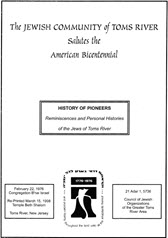THE LOUIS POLSKY FAMILY
Kindly forgive me, if in telling you of the founders of Jewish communal life in Toms River, I may be editorializing . The present is so shabby when compared to the past, that I wish with all my heart that we could emulate the Cohens, Socolows, Dardicks, Estomins, Ledermans, Sachs, Pincuses and all the other fine Jewish families that settled and pioneered this area.
It all began in the late twenties and early thirties. There were four Yiddish newspapers, reflecting every shade of opinion. The Yiddish theater was represented in every Jewish enclave in New York, Brownsville, the Bronx and the lower Eastside had their own attractions. Not every production was a work of art. We did have Maurice Schwartz's art theater. I shall never forget the Elder Schildcraut's "Bronx Express".
On the educational level, the children of the founders went either to the Arbeiter Ring (Workmen's Circle) or the Sholem Alechem Folk Shule (school). Ours was a secular education. There was no Alef Beys biz Bar Mietzvah schooling for us. Most of us went on into our late teens, studying our great Y. L. Perez, Hirshbein, Sholem Alechem, and others in the original Mama Lushen. We were taught of the trials and tribulations of our ancestors living in the anti Semitic overt atmosphere of Poland Russia and the Baltic States. We were also well informed of the covert brand that characterized the so-called western European countries. We used to attend these Mitel Sheles or high schools on an eight hour daily schedule on Saturdays and Sundays. I might add that we were rounded in the history of our people, their philosophy and life in the world over. We spoke, read and wrote the language of our heroic brothers and sisters of the Warsaw Ghetto.
As to my parents' background, they fled Russia during the pogroms following World War
I. They fled a country that can only be compared to present day South Africa. The Czarist regime practiced the same apartheid as Kissenger's Angolan ally. Jews could not own land. Secular education was almost unattainable. Moscow was off limits after dark. Each Jew had to carry papers marked "Yevrei" or Jew. This was the polite express ion. The most used was "Jid'! or Sheeny. The most common saying was "beat Jiddy and save Russia."
To establish a life that was denied them in the old world, to live with people of varying political persuasions , but of the highest cultural background, to own land not for speculation, but to work it and harvest it, to be no longer "luft menshen", but productive to be able to call your neighbors brothers and sisters at community meetings or chaver or chaveret; these were the rewards of settling in Toms River.
In 1932 after we lived in Toms River for a year, some scornful landsmen asked my dad how much he made that year. When he gave them the five hundred dollar figure, they were dismayed . In reply, he said, "how much of a dollar value will you put on my twenty apple trees in blossom." You might ask, how we could survive on such a meager income.
My grandmother and I demolished an old barn for heat. In her seventies, she could swing an ax as well as Carrie Nation. I milked three cows before the school bus came. At ten cents a quart we made more on them, than on the two thousand chickens we had. We also had an acre garden.
Old Freehold Road in those days was called by the long time residents "Jerusalem Avenue" . Where the present golf course is situated was the biggest dairy farm in the area. When Mr. Mc Guire, the owner was on his death bed, he requested that his Jewish neighbors act as pall bearers. His reasoning I surmise was that the people who gave him his land would ease his way to heaven. We were looked upon with awe, tempered with curiosity. In my high school graduating class there were only three Jews.
We had our amateur Yiddish theater. Bernie Sachs' Father played the lover of my teen aged sister. The efforts and the rewarding receptions given these Yiddish plays was a sheer joy to behold. We used to assemble on summer evenings near the Toms River Jewish Farmers' Community House. There was adjacent to it a refreshment stand run by the Golubchick family. Long before the days of car pools, when you could reach your neighbors on the party line, you would ask them if they needed a ride into town. You could not walk the length of a few houses without being called in for tea or a drink. When sickness hit our chickens, it was the practice of a half dozen neighbors to come and help us vaccinate . To illustrate the morality of the times, Dr. Sawyer spoke in our community center on behalf of socialized medicine. Anytime he visited a family in need, he would forgo his fee and leave money on the table.
In closing, I can only sum up that in writing of the past, I am saddened by the present. Will our people live a moral life like the founders of our Jewish community? Will love of fellow Jews and mankind in general supercede the profit motive? Please understand that in writing of the past, I have not lost hope for the resumption of the goals and aspirations of the founders of the communal Jewish life in Toms River.
Louis Polsky
